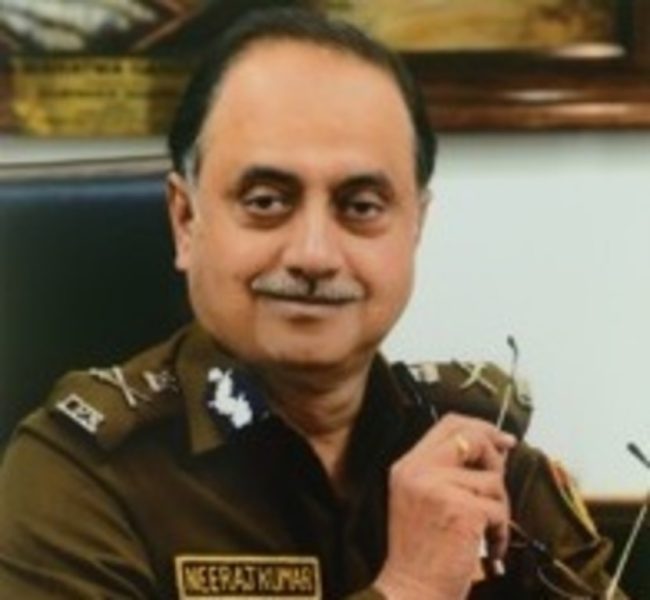
Ex-cop Neeraj Kumar calls for restructuring of BCCI's Anti-Corruption Unit

Neeraj Kumar, a retired IPS officer and former head of the Anti-Corruption Unit (ACU) in the Board of Control for Cricket in India (BCCI), argues that match-fixing is just the tip of the iceberg in cricket corruption. He calls for a significant overhaul of the ACU to combat illicit activities.
A 1976-batch Indian Police Service (IPS) officer, Kumar, who retired as Delhi Police commissioner in 2013, made the observations and suggestions in his 216-page book “A Cop in Cricket”, summing up his three years association with the national governing body of cricket in India from 2015 to 2018.
Also Read: WPL 2023: Schedule, format, free entry, squads, DRS, live TV, streaming and more
Kumar, who was called by the Metropolitan Police of London to give his advice on the security for Olympics 2012 after the British authorities were happy about his arrangement of Commonwealth Games 2010, feels that cricket is not just a game in India.
“It is also an industry with many spin-off vocations. But not all of these vocations are clean, with fixers and charlatans getting into the mix in a major way to bring a bad name to the game,” he says.
In his book, Kumar writes that during the three years he spent at the BCCI he realized that fixing was “the proverbial tip of the huge iceberg of corruption in cricket. Fixing is, in fact, a minuscule percentage of the large-scale chicanery that cricket administrators indulge in.”
Also Read: Indore pitch: ICC rates it poor after Australia thrashed India in third Test
Neeraj Kumar describes his time in the BCCI as an “awkward phase” of his life. Having served in the Indian Police Service (IPS) for 37 years, he states that this period was characterized by feelings of “ignominy, hurt, and humiliation”.
“By the end of those three years there (in BCCI), my much-celebrated career in the police seemed a distant memory. The respectability that it had fetched me seemed to have been shredded – ignominy, hurt and unrelenting humiliation seemed my lot,” he writes in the preface of his book.
Highlighting the details of the much-publicised cricket spot-fixing case in May 2013 during the Indian Premier League (IPL) 6 which saw three cricketers and 35 bookies being arrested, Kumar says the Delhi Police operation led to wider investigations, which, in turn, led to an even more startling revelation — team owners were also involved in match and spot-fixing.
Referring to the subsequent events and the intervention of the Supreme Court which first formed Mudgal Committee in 2013 and Lodha Committee, both headed by retired judges, Kumar says it was a move to improve the functioning of the BCCI so that sporting frauds and conflicts of interest could be prevented, players welfare improved and the board could be responsive and accountable to the public at large.
Also Read: World Test Championship: What should India do to qualify for WTC final?
“The Lodha Committee report made pathbreaking recommendations on the structure of the BCCI, its governance, management, the creation of a players association, conflict of interest and so on,” he says, adding both the Mudgal Committee and Lodha Committee emphasized on curbing corruption in Indian cricket.
However, neither committees had anything concrete about the outfit the BCCI should put in place to achieve this end, he says.
“…the existing structure and functioning of the ACU was not reviewed, let alone any recommendation made for its strengthening or augmentation. More regrettably, neither committee recommended the enactment of effective legislation by lawmakers that would define terms like match-fixing and spot-fixing, to make them criminal offences punishable under the law,” he says.
Suggesting measures, Kumar says for the ACU to become an effective intelligence gathering unit, it must act as an interface between cricket-victims of fraud and the police.
Also Read: Sunil Chhetri’s controversial ISL goal: What does free kicks law say?
“To get information on the ground level on manipulative goings-on in cricket, the ACU must be perceived as a sympathetic listening post and an attempt to help those who are truly victims and not active collaborators in a scam,” the book reads.
Similarly, Kumar says for the ACU to gain credibility and currency, it must intervene and disrupt unauthorized T20 leagues as soon as it is tipped off on them.
“The ACUs role as a security unit — the pivot around which the security infrastructure for the players and games revolves…this is an added responsibility that the unit took upon itself in late 2015. This is why hereon I will refer to the ACU as the Anti-Corruption and Security Unit (ACSU),” he said.
Kumar says security for players and anti-corruption measures are inextricably intertwined and cannot be siloed.
Also Read: Kerala Blasters forfeit ISL game | Sunil Chhetri: ‘Never seen in 22-year career’
“Another important point is that the ACSU, to be successful at all, must develop working relations with various other investigative and security agencies, notably the local police in whose jurisdictions matches are held.
“Local police are the most critical in the anti-corruption chain, as it is they who can register cases and carry out investigations since the ACSU doesn’t have these powers,” he says.
(With agency inputs)


